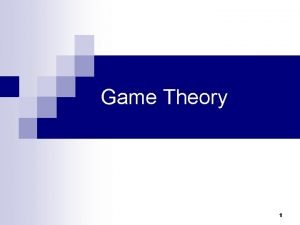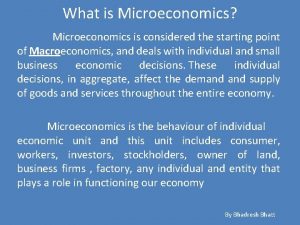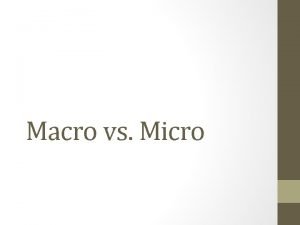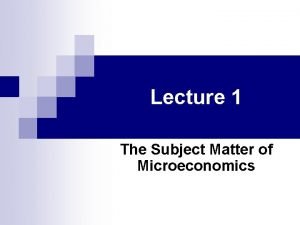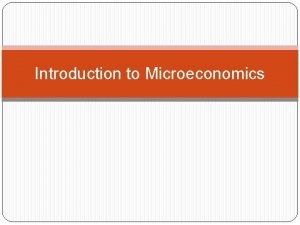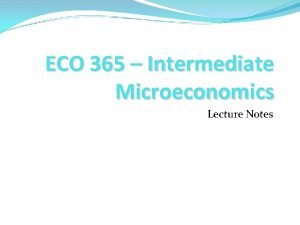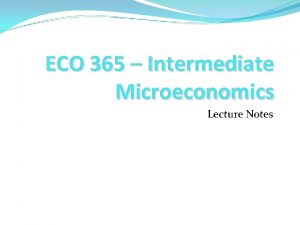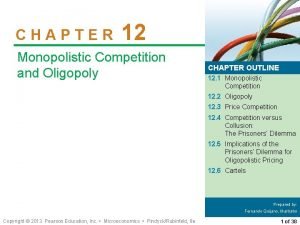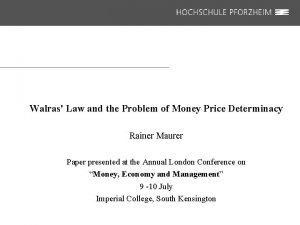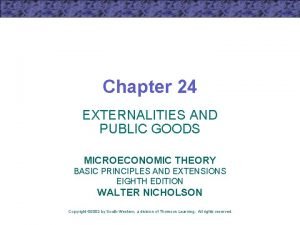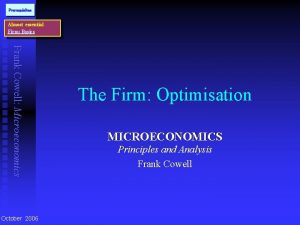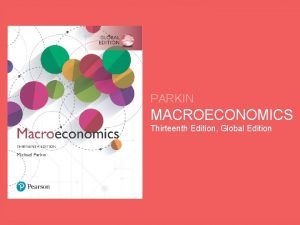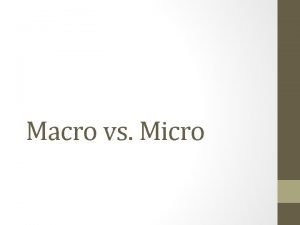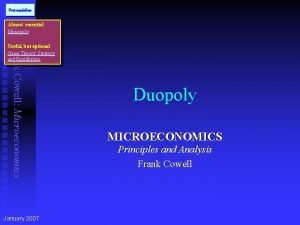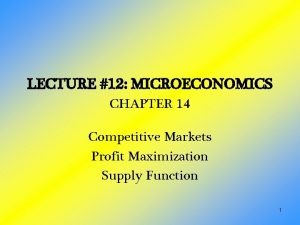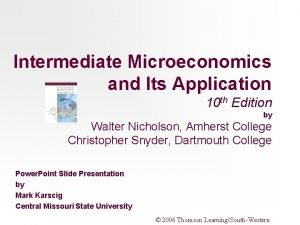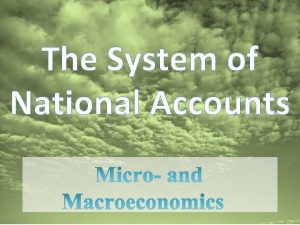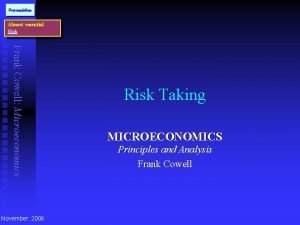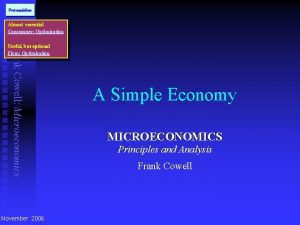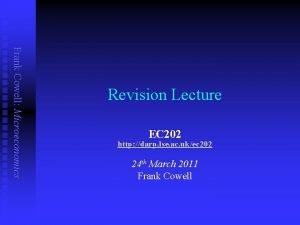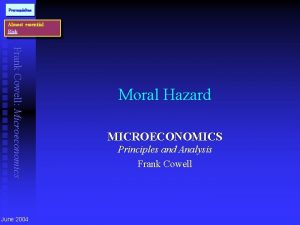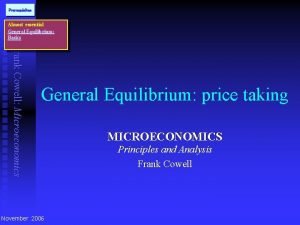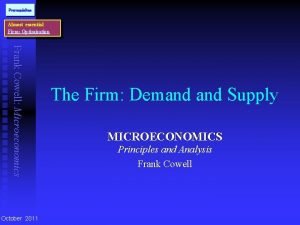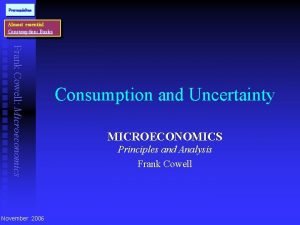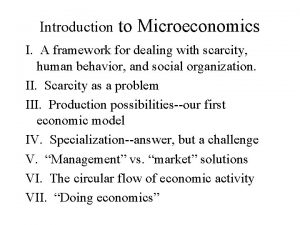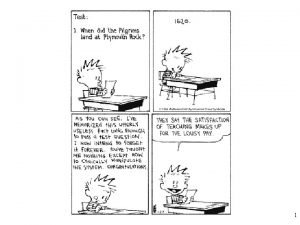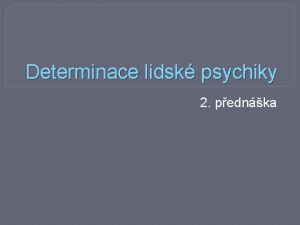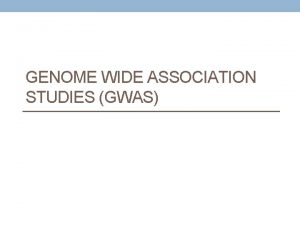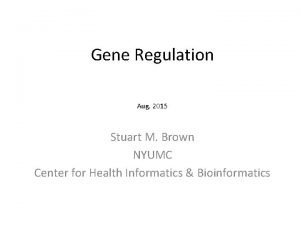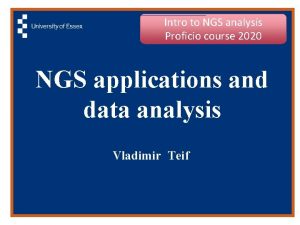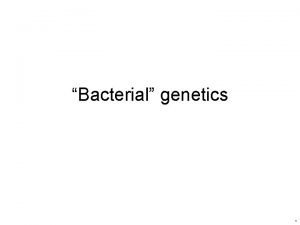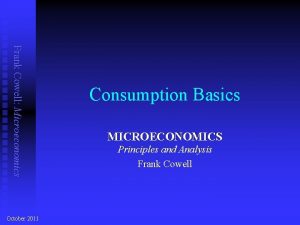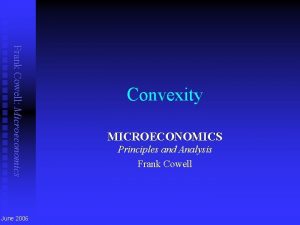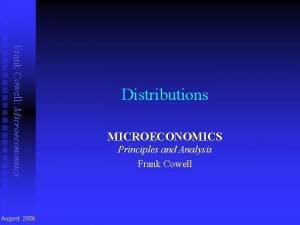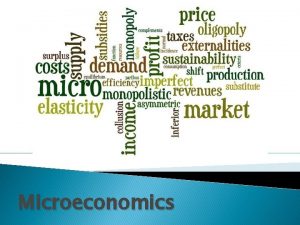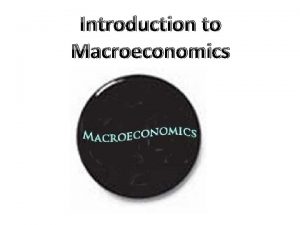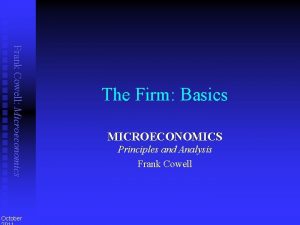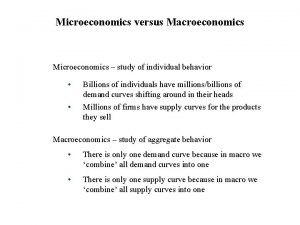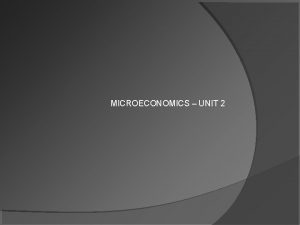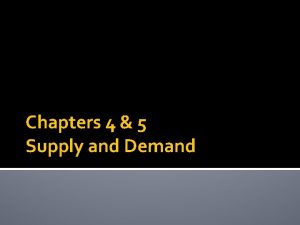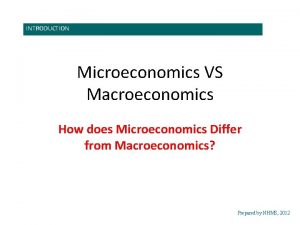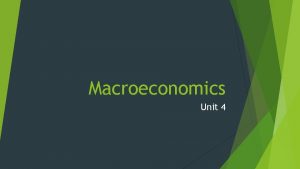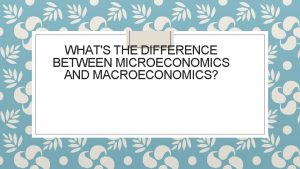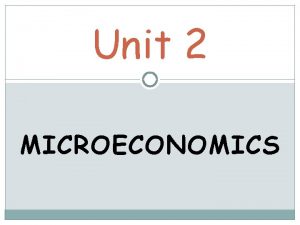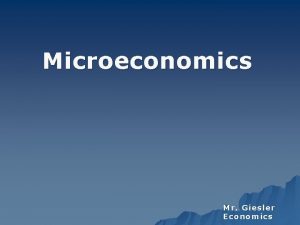Microeconomics AP CH 1 Review Game The Nature












































- Slides: 44

Microeconomics AP CH 1 Review Game The Nature of Economics

Macroeconomics is concerned with A) B) C) D) changes in unemployment. changes in the price of gasoline. the effects of a tax on beer. the effects of price controls on steel.

Economics is a social science and seeks to explain A) B) C) D) why people are greedy. how goods and services satisfy human wants. real events. the stock market.

Another word for “aggregate: is A) B) C) D) complete. partial. public. total.

The purpose of economics is to understand A) C) money. choices. B) unemployment. D) all human activity.

Wants are A) another term for needs. B) the things people would consume if they had unlimited income. C) the thinks people would consume after their needs have been met. D) all the things people would like to consume but can’t afford.

Microeconomics is concerned with the study of A) B) C) D) the causes of unemployment. the effects of government spending. the behavior of economy as a whole. the behavior of individual decision-makers.

Microeconomics is concerned with the study of A) B) C) D) the effects of inflation. the effects of government spending. the effects of an increase in the price of coal. aggregate demand.

Macroeconomics is concerned with A) B) C) D) individual business firms. industries. consumers. aggregates.

Economists assume people are motivated by A) B) C) D) selfishness. pride. self—interest. social justice.

Economists assume people behave A)instinctively. B) rationally. C) reasonably. D)greedily.

The distinction between microeconomics and macroeconomics is A) clearly drawn, and there is no overlap between them. B) determined by whether aggregates or totals are studied. C) narrowly drawn, and microeconomic analysis often relies on macroeconomic tools. D) often blurred because aggregates are made up of individuals and firms.

Economics is the study of A) how to get rich. B) how people allocate their resources to satisfy their wants. C) how people allocate their income to meet their needs. D) why people want certain goods and services rather than other goods and services.

People behave rationally when they A) follow the advice of economists. B) never have regrets about their decisions. C) make decisions they think will make themselves better off. D) make decisions based on scientifically—proved criteria.

Modern economists are increasingly using microeconomic analysis in macroeconomics because A) microeconomic theory is more scientific. B) all decisions are made by individuals. C) macroeconomic subjects such as inflation affect all individuals. D) macroeconomics is older and more outdated.

Older people, on average, show less interest in learning how to use new technologies because A) older people aren’t as smart as young people today. B) they are acting irrationally. C) they have fewer years to gain a return from their investment. D) the cost to older people is greater than the cost to younger people.

Economics is a social science that involves the study of how individuals A) develop their tastes and preferences. B) maximize their wealth. C) define happiness. D) choose among alternatives to satisfy their unlimited wants.

Incentives are A) potential rewards available if a particular activity is undertaken. B) ineffective as a device to get people to behave in a certain fashion. C) inappropriate ways to obtain a certain kind of behavior. D) useless when people behave rationally.

Economics is concerned with choices A) that involve the wants of individuals. B) that involve the needs of individuals. C) made by individuals only when they are consuming goods or services. D) that involve money.

Economics is a part of the A) C) social sciences. B) natural sciences. biological sciences. D) organization sciences.

Which of the following is a true statement about the economic assumption of rationality? A) Individuals try to act rationally at all times. B) Individuals act as though they are rational. C) Individual behavior may be irrational but group behavior is always rational. D) People make decisions as if they are omniscient.

The threat of a large fine for failure to pay income taxes is an example of A) the excessive power of the Internal Revenue Service. B) the ineffectiveness of incentives to get people to pay their taxes. C) a negative incentive to reduce tax—cheating. D) people failing to consider all the benefits the government provides them.

A decision made by a rational person A) never would make the person worse off. B) would always make the person wealthier. C) is identical to a decision that would be made by any other rational person facing the same choices. D) is intended to make the person better off.

If people make choices rationally, then A) their behavior is predictable. B) they will never have regrets over the decision they made. C) everyone facing the same alternatives will make the same choice. D) they do not behave in a self—interested manner.

As life spans in a country increase, we would expect (on average) A) B) C) D) people to have more children. people to invest more in education. the retirement age to decrease. that new technologies would be resisted more.

Positive or Normative? “A rise in consumer incomes will lead to a rise in the demand for new cars”

Positive or Normative? “A rise in consumer incomes will lead to a rise in the demand for new cars” POSITIVE

Which of the following would not provide an incentive to reduce the amount of beef consumed? A) B) C) D) An increase in the price of beef A tax on ranchers An increase in the price of chicken A ban on beef sales by the

People respond to incentives A) B) C) D) with anger. only when they are irrational. by calculating costs and benefits to themselves. when they are not motivated by self interest.

A politician says that the government should tax behavior they want less of and subsidize behavior they want more of. This is an example of A) cynical behavior in modern democracies. B) failing to consider the incentives available to the government. C) a concern that people are not rational when they make decisions. D) using incentives to alter behavior.

Positive or Nortmative? “ The level of tax on gas is too unfair and unfairly penalizes motorists”

Positive or Nortmative? “ The level of tax on gas is too unfair and unfairly penalizes motorists” NORMATIVE

Self—interest A) implies that a person tries to increase one’s wealth at all times. B) implies that people will not give to charities unless there is a tax break to do so. C) is consistent with many goals that people strive for. D) applies only to people in market settings.

Shelley’s grandmother gave her socks for Christmas, but Shelley wanted a CD. This implies that A) Shelley’s grandmother is acting out of self interest because she knows what Shelley really needs. B) Shelley’s grandmother is acting out of self interest because she wanted to give Shelley something useful. C) it is in Shelley’s self—interest to refuse to wear the socks. D) Shelley should exchange the socks for a CD.

An economic theory is also known as an economic A) B) C) D) model. design. miracle. assumption.

A simplified representation of the real world that is used to explain economic phenomena is a(n) A) B) C) D) paradox. assumption. inference. model.

Economic models are not used to A) explain economic phenomena. B) predict economic phenomena. C) understand economic phenomena. D) minutely describe economic phenomena.

To test their theories, economists usually have to A) set up careful laboratory experiments. B) examine what has already happened in the real world. C) use models. D) predict future economic events.

In an economic model, assumptions A) must be realistic if the model is to be applicable to many real—world situations. B) must be tested before using to make sure the model is realistic. C) determine the usefulness of the model. D) define the set of circumstances in which the model is most likely to be applicable.

Which of the following ways to obtain soldiers utilizes incentives? A) B) C) D) A draft Universal service Higher salaries Longer lengths of service

Suppose the government wants investment spending to increase. One way to do this would be A) to increase taxes on saving. B) to raise social security benefits. C) to reduce the sales tax. D) to reduce taxes on interest and dividend income.

Positive or Normative? “ The government is right to introduce a ban on smoking in public places”

Positive or Normative? “ The government is right to introduce a ban on smoking in public places” POSITIVE

“Ceteris paribus” means A)“invisible hand. ” B) “other things constant. ” C) “making all the necessary changes. ” D)“economic man. ”
 Mark eytter
Mark eytter What is microeconomics
What is microeconomics Micro and macro economics venn diagram
Micro and macro economics venn diagram What is the subject matter of microeconomics
What is the subject matter of microeconomics Uses of microeconomics
Uses of microeconomics Intermediate microeconomics lecture notes
Intermediate microeconomics lecture notes Intermediate microeconomics notes
Intermediate microeconomics notes Oligopoly model
Oligopoly model Walras’ law
Walras’ law Pure public good
Pure public good Cowell microeconomics
Cowell microeconomics Microeconomics michael parkin 13th edition
Microeconomics michael parkin 13th edition Venn diagram of macroeconomics and microeconomics
Venn diagram of macroeconomics and microeconomics Objectives of microeconomics
Objectives of microeconomics Almost essential
Almost essential Microeconomics
Microeconomics Uses of microeconomics
Uses of microeconomics Economics subject
Economics subject Microeconomics chapter 12
Microeconomics chapter 12 Cowell microeconomics
Cowell microeconomics Almost essential
Almost essential Microeconomics examples
Microeconomics examples Circulair flow marketing
Circulair flow marketing Cowell microeconomics
Cowell microeconomics Cowell microeconomics
Cowell microeconomics Almost essential
Almost essential Cowell microeconomics
Cowell microeconomics Cowell microeconomics
Cowell microeconomics Microeconomics ia
Microeconomics ia 22 rents
22 rents Ap microeconomics unit 1 basic economic concepts
Ap microeconomics unit 1 basic economic concepts Nature and nature's laws lay hid in night meaning
Nature and nature's laws lay hid in night meaning Determinace lidské psychiky
Determinace lidské psychiky Nature review genetics
Nature review genetics Nature review genetics
Nature review genetics Gwas
Gwas Nature review genetics
Nature review genetics Nature review genetics
Nature review genetics Nature review genetics
Nature review genetics Hình ảnh bộ gõ cơ thể búng tay
Hình ảnh bộ gõ cơ thể búng tay Frameset trong html5
Frameset trong html5 Bổ thể
Bổ thể Tỉ lệ cơ thể trẻ em
Tỉ lệ cơ thể trẻ em Gấu đi như thế nào
Gấu đi như thế nào Tư thế worm breton
Tư thế worm breton
